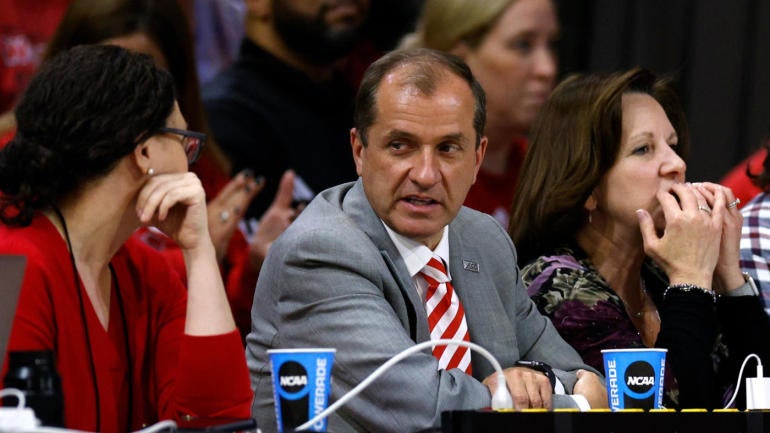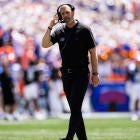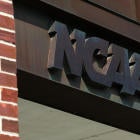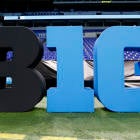
AMELIA ISLAND, Fla. -- The future of Florida State and Clemson, amid ongoing litigation against the Atlantic Coast Conference, loomed over the ACC spring meetings this week, but commissioner Jim Phillips remained optimistic that those relationships could still be salvaged.
The conference is currently embroiled in multiple lawsuits with Florida State and Clemson as the two schools legally challenge the ACC's grant of rights and position themselves to possibly leave the conference. At the center of the dispute is the ACC falling behind rival conferences the Big Ten and the Southeastern Conference in revenue, a disparity that will only grow under the new College Football Playoff distribution model.
Florida State and Clemson leaving the ACC has long felt like a fait accompli, only amplified by the multiple lawsuits that have been filed, and yet Phillips, one of the nicest people in a cutthroat industry, insisted that he was going to stay positive about all possible outcomes in the face of mounting evidence of an impending divorce.
"I'm always optimistic about a really good ending on a difficult situation," Phillips said. "I'll never change until somebody else tells me differently. Am I going to fight and protect the ACC? Absolutely. I have to do that. That's my responsibility."
Phillips came off more bullish about the chances of the relationship being salvaged than Florida State athletic director Michael Alford who was asked a similar question a day earlier. Alford was careful to only speak positively about the great relationships the school enjoyed within the conference and seemed thankful that FSU was included in all meetings this week in Amelia Island. But when asked about whether the marriage could still be saved, Alford said, "We'll just wait for that to play out" and that "we've got to do what's best for Florida State and look at the changing environment of collegiate athletics and make sure we're there to be successful."
The public optimism expressed at the conclusion of the ACC meetings doesn't mean Phillips isn't frustrated by the situation, however. He reiterated Wednesday that Florida State and Clemson's actions aren't helpful and worried that they are overshadowing all of the positive things happening within the conference.
"It's difficult, it's disruptive, it's harmful but that's world we live in," the ACC commissioner said. "They have their ability to do the things they are doing and we'll let the legal folks handle it because that's the right thing to do."
Not only is the conference facing lawsuits from Clemson and Florida State challenging its ironclad grant of rights, but the league is also facing questions about its lengthy television media contract with ESPN that runs through 2036. Florida State claimed in a lawsuit filed in December that the ACC's deal with ESPN includes a unilateral option for the network that must be executed in February 2025 to extend the deal through 2036. In essence, ESPN could nix the contract and step away in 2027.
Phillips, however, reiterated Wednesday that the conference's business relationship with ESPN is strong.
"I can't go into the details on it but the partnership is not going away or going to be affected in a negative way at all," he said. "It's a look-in and we're handling some of what that particular element of the contract states."
ESPN's contract is not available for public consumption, and the only details to leak have come via the five ongoing lawsuits among the ACC, FSU and Clemson. When asked if the look-in provision allows for a change in the financial structure of the agreement, Phillips declined to confirm. "I won't discuss that publicly because we haven't got to the finish line yet on what we're talking about," he said.
Theoretically, expanding the conference with the additions of SMU, Cal and Stanford in the fall could help those financial figures as the ACC Network taps into the Dallas and Northern California television markets.
"We have full distribution in our current states and our current markets, and that was something when I came in three and a half years ago I heard angst about: we're not in all markets of where our school are (located) and we're not getting the revenue off of that when you're not in the market," Phillips said. "So we've been in full distribution -- and that's the goal as we get into Northern California and into Dallas."
If multiple lawsuits, the looming threat of Florida State and Clemson defecting from the conference, and the potential settlement of the House v. NCAA lawsuit leading to a seismic shift toward revenue-sharing (as much as $22 million per school annually) were not enough to make an accountant's head spin, the ACC is still combing through the details of "success initiatives" proposed by Clemson and Florida State 18 months ago that would reward programs financially for on-field and on-court success.
Phillips and athletic directors again didn't elaborate on the particulars of the model, which will factor in regular-season and postseason success and is expected to lean heavily on football success. Sources told CBS Sports that cumulative bonuses for a team that wins the national championship could balloon up to $20 million in one concept discussed among leaders. A first-round appearance in the new 12- or 14-team playoff would reward the team with a $4 million bonus, sources said.
Florida State and Clemson have dominated the realignment conversation because of their lawsuits, but that revenue unhappiness isn't limited to those two ACC schools. A University of North Carolina trustees meeting, which delved into trustees being upset about how UNC AD Bubba Cunningham managed the athletic department revenue, included one trustee pushing for the school to consider leaving the conference it helped create in 1953. Cunningham told CBS Sports earlier this week he didn't have a reaction to it and would be prepared for a trustees meeting on Thursday.
"I am advocating for that," trustee Dave Boliek said during the meeting. "That's what we need to do. We need to do everything we can to get there. Or the alternative is the ACC is going to have to reconstruct itself. I think all options are on the table."
Phillips said Wednesday he hoped to learn more about the situation when he returned to the conference's Charlotte headquarters, but to this point no one from the school had said anything to him or the league about a desire to leave.
"Those are campus discussions and campus politics that are going on so I don't know what's true and what's not," he said.





















